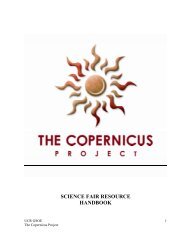Science Education: Not Just for Teachers Anymore! - Copernicus ...
Science Education: Not Just for Teachers Anymore! - Copernicus ...
Science Education: Not Just for Teachers Anymore! - Copernicus ...
You also want an ePaper? Increase the reach of your titles
YUMPU automatically turns print PDFs into web optimized ePapers that Google loves.
GRADUATE SCHOOL OF EDUCATIONTHE COPERNICUS PROJECTFebruary 20 th , 2008Welcome to the second annual <strong>Copernicus</strong> <strong>Science</strong> <strong>Education</strong> Summit Conference. Thank you<strong>for</strong> making the decision to be here today. Our Summit theme this year is: <strong>Science</strong> <strong>Education</strong>:<strong>Not</strong> <strong>Just</strong> <strong>for</strong> <strong>Teachers</strong> <strong>Anymore</strong>! Voices of Our Communities of Learning. We deeply value therichness of your experiences and shared visions <strong>for</strong> the future of science education.1362 Sproul HallRiverside, Ca 92521Tel 951.827.5722Fax 951.827.3168copernicus@ucr.educopernicusproject.ucr.eduThe goals <strong>for</strong> our Summit Conference are broad-reaching, and set within the context of ourrapidly growing awareness that the world, as we know it, has been <strong>for</strong>ever changed by the rise ofthe Digital Age and the Global Economy. Our students—even the youngest—are also changed.The average college graduate has spent over 10,000 hours playing video games, 10,000 hours oncell phones and roughly 20,000 hours watching TV (Prensky, 2001, Digital Natives, DigitalImmigrants). In any given day, 68% of children under two years of age will use a screen media<strong>for</strong> slightly over two hours (Kaiser Family Foundation, 2003).Are we preparing the next generation of teachers to meet these students? Will all students haveequal access to high per<strong>for</strong>mance teaching and learning? Plainly stated, the next great, imminentsocial and economic divide—at the transnational level--will be among those with the science,technology and mathematics education and skills to participate in the global economy, and thosewho lack them. As educators--and we use the term broadly to include all of us who are heretoday--this is the challenge we face. If we are to continue to thrive and flourish as a state and as anation, we must meet that challenge with all of the <strong>for</strong>ce and economies of scale at our collectivedisposal.Toward that end, the <strong>Copernicus</strong> Project is centered in early identification of future <strong>Science</strong>teachers, systematic recruitment from a diverse pool of candidates from community colleges andhigh schools, high quality and focused teacher preparation, and sustained, mentored professionaldevelopment support <strong>for</strong> new and veteran teachers.We are now in the fourth year of our five-year project. The outpouring of intellectual, economic,political and grassroots support across educational agencies, institutions and businesses has beenboth humbling and galvanizing. Building upon the strength of our success and accomplishmentsthrough partnerships, the <strong>Copernicus</strong> leadership team has begun to create a bridge to a sustainedfuture <strong>for</strong> our shared work toward improving science and mathematics education, through thepreparation of high per<strong>for</strong>mance teachers.Clearly, science education is not just <strong>for</strong> teachers anymore, but <strong>for</strong> all of us. We take this day tocelebrate and to learn from each other!Sincerely,Linda Scott HendrickCo-Principle InvestigatorThe <strong>Copernicus</strong> ProjectAthena WaiteCo-Principle InvestigatorThe <strong>Copernicus</strong> ProjectFebruary 20, 20084<strong>Science</strong> <strong>Education</strong> Summit








